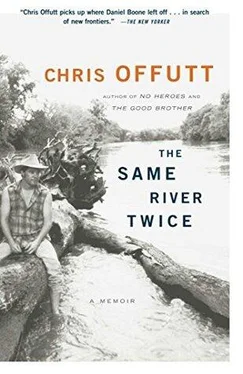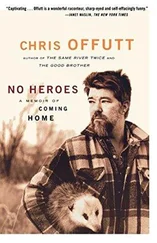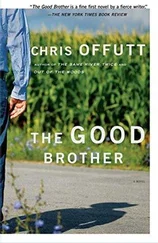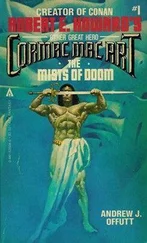I nodded.
“Well,” he said, “fags look at men the same way. If you’re gay, you know it. But don’t wait until you’re fifty to come out of the closet. There’s nothing worse than an old queen. I couldn’t get laid in prison.”
Two of my past girlfriends had been involved with women. Another had hoped to sleep with a woman as an “empowering experience.” I told Sophia about them and she explained that our society was a dinosaur shuffling toward calamity. We’d betrayed Mother Earth, a bitter old woman who’d married out of faith. I told her that Appalachians didn’t fit that category.
“We did a unit on you,” she said.
“What?”
“In school. Advanced Sociology. You’re oppressed, you know.”
“No I’m not. I left.”
“Good for you. That’s like coming out of the closet.”
“Not exactly.”
“I think you’ve got some lesbian in you, Chris. You’re like a sister to Diana and me.”
“What time is it? I have to go find a job.”
“You just think you have to. It’s conditioning. No woman should wash dishes for a living.”
“I’m a man.”
“Yeah, I guess so.”
I left, considering her idea. Perhaps she was right, and the miasmic flow of my life was merely stress from being a lesbian trapped inside a man’s body. I could save money and have a sex change. Then I could surrender to the narcissism of loving that which I was — a woman.
When spring arrived we opened the windows, a mistake that cost our idyllic life. The sound of Sophia and Diana’s amorous uproar carried into the neighborhood. Just after the peak of their joy one night, a banging began at the front door. I crossed the kitchen and greeted Romero fidgeting in his long johns.
“You have trouble here,” he said, glancing past me to scan the kitchen.
“No trouble. Everything’s fine.”
“I hear all week a woman being beat. That is not fine. Not every night.”
“Really, Romero. It’s okay.”
“Where is the big one?”
“Do you think I could beat her?”
“And the other? She lives here now?”
“No. She’s a friend.”
“Of who?”
“She’s my girlfriend.”
Romero closed his eyes, aware of my lie, face pained with disappointment.
“She must go. Both of them. One month.”
He shook his head and descended the narrow stairs, a successful immigrant bamboozled by America.
I informed Diana over morning coffee. Her entire head became red. She walked to her room and calmly tore the door from its hinges. Ten minutes later she left, abandoning everything she owned, a decision I respected.
Snugly unemployed, I developed an eating system at the faithful Lune Café. I sauntered in every day for organic gruel and gave Orion a five-dollar bill. Pretending to make change, he handed me the five, plus four ones. I left the singles for a tip and kept the five. He called it exploiting the oppressor. All spring the same five bucks bought lunch, often my only meal.
I came home to learn that Shadrack had showered while I was gone. My towel was missing. I called to ask him about it.
“Get a new one,” he said.
“I only need one.”
“It’s more sanitary to have a couple.”
“For who, you or me?”
“The world, Chris. You have to think in terms of global health.”
“Well, I’ve got one more towel than you do.”
“Not anymore.”
He agreed to return the towel if I bought him a beer. We met at a bar and conversation steered unerringly to suicide. Shadrack believed that talking about it prevented the occurrence, by “keeping it in the world, not in my head.”
“Why keep the idea alive at all?” I said.
“You’re missing the point. Suicide is for people who care about life. Mine doesn’t matter. First I’ll get a hot-air balloon and set it up with one rope tying it to the ground. The balloon is a circle seen from any direction. The perfect mandala. I’ll hang a noose from the bottom and put my head in. Then I’ll cut the anchor line. The flight strangles me in the air.”
“What about a note?”
“That’s pinned to my chest. It says, ‘Bury me where I land.’ ”
“Like Robin Hood’s arrow.”
“Not bad, huh? I need two video cameras, one on the ground and one in the balloon. My final work of art. It’ll start a movement. I’ll be famous.”
“Is this a threat because I want my towel back?”
“Relax. Planning all the details keeps it at bay, like a jar of pennies when you’re broke. You know what I worry about? That suicide just puts things off. You don’t die, you just wander after the living like a deaf Pied Piper.”
“Your superstition is showing.”
“What do you mean?”
“Purgatory.”
“Did you know that comes from the word ‘purge’?”
Half listening to his lecture on the etymology of death, I looked around the murky bar lined by sad faces atop sagging bodies. Perched on the last stool beside the door was a patient hooker sipping sweet drinks. She didn’t look bad.
“Painting is a waste,” Shadrack said. “I think I’ll quit and join a Trappist monastery. It’s the same as suicide except you have to live. Know what I mean, Chris?”
“Nope.”
“The vow of silence.”
“I wouldn’t mind if you took that.”
“I’m serious. I should go to India and steal a cart so they’ll cut my hands off. That way I can’t make things, the vow of visual silence.”
“Why don’t you start with a finger,” I said.
“Why don’t you write a poem!”
“Maybe I took a vow.”
“I think you’re scared.”
“The only thing I’m scared of is snakes.”
“Look, Chris. You better start writing or you’ll wind up like me.”
The words had flowed without prior thought and I watched their meaning seep into him. Shadrack seemed to shrivel. Very slowly he pushed his beer glass off the table. It shattered against the floor. There was deliberation in the act, rather than violence; the careful work of controlled passion. He leaned across the table, his voice a hard whisper.
“That’s poetry, my friend. That’s how you write it.”
He handed me the towel as if he were a master of tae kwon do granting a star pupil the highest belt.
“Now leave me alone,” he said. “Go write.”
The bartender walked over and I apologized, offered to pay for the glass. Shadrack was gone and I hadn’t seen him leave. We’d argued before, often mightily, but this time there was a finality to his calm. I thought about our past conversations, his view of the artist as shaman. He considered the process of making art to be holy. Shadrack had given me permission and now he was gone.
During the next nine weeks, I faced my typewriter and never wrote a word. I rolled a fresh page into the machine and stared like a statue for fifteen hours. At the day’s end I placed the blank page to the right of my typewriter. My mind was a tornado. I ceased to bathe, eat, or shave. I simply continued to write without writing.
My brain began to operate in a lucid fashion, seeing details of memory melting into dialogue. I was invigorated by the electrical crossfire in my head. On particularly luminous days, my brain pulsed in a state of ecstasy. The moment I awoke, I rushed to use it, sliding into the marvelous oblivion of self-content, flowing with the same aimless delight of hitchhiking. My mind entered the blank white page to observe myself: a thin skin bag over a fragile gantry of bone. Cartilage hinged the moving parts.
Mail ruined my discipline, bringing a birthday card from my mother. Without quite noticing, I had become thirty years old. I went out for a pint of bourbon, drank it too fast, and got sick. I was in that panting, sweaty state when men swore off alcohol, bargained with God, and resolved to hold a job. I had done it many times. Though I refused to admit failure, I was certainly engaged in failing. The time had come to squirrel a grubstake and leave Boston.
Читать дальше












